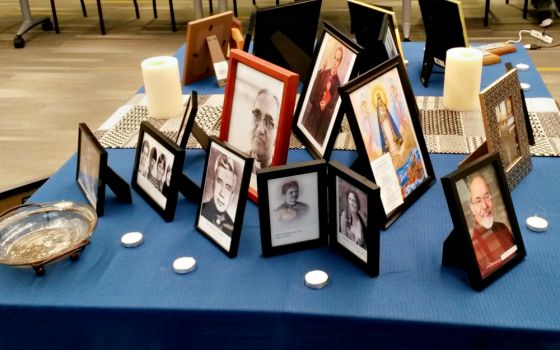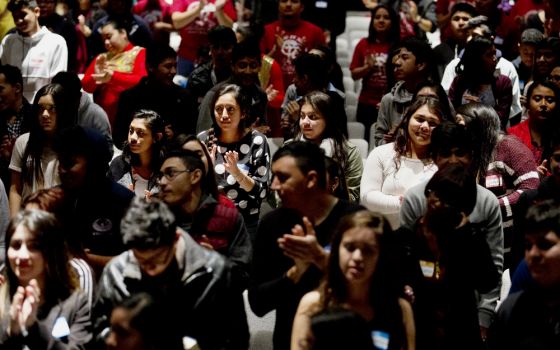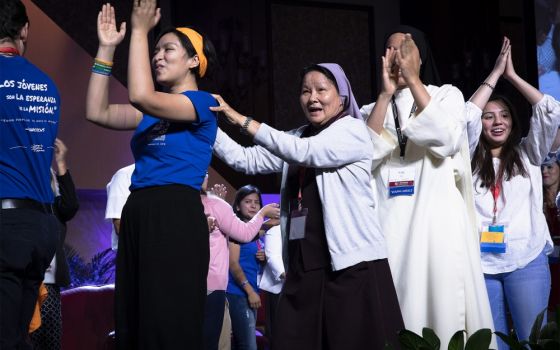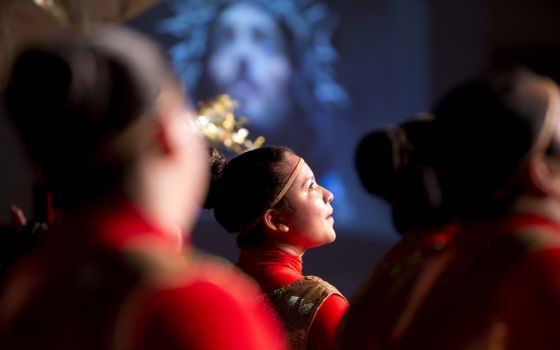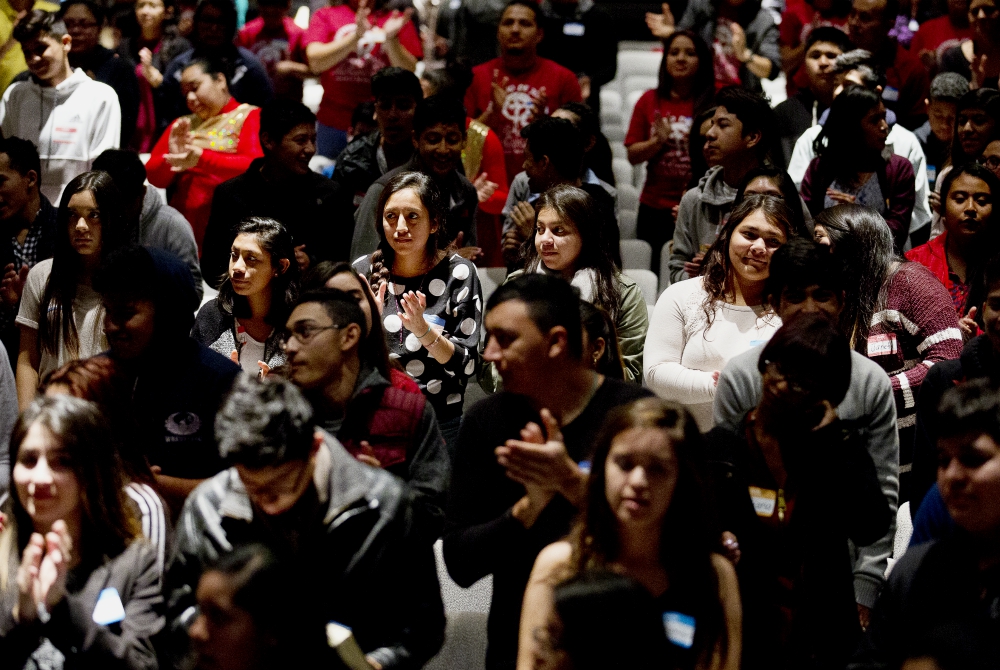
Hispanic/Latino young adults are seen during a daylong regional encuentro Oct. 28, 2017, at Herndon Middle School in Herndon, Virginia. (CNS/Tyler Orsburn)
During breaks at the national V Encuentro in Grapevine, Texas, where a "wildly enthusiastic young crowd" of around 3,000 Latino delegates at one point chanted, "We love you," at attending bishops, Bishop Joseph Tyson would return to his hotel room to answer English-speaking parishioners' angry emails and letters about the sex abuse crisis.
"That's why I feel that I live between two worlds," he told NCR.
Tyson, bishop of Yakima, Washington, emphasized that he believes Catholic Latinos do care about sex abuse in the church. But he sees a world of difference between their subdued response to recent revelations of sex abuse and cover-up in the church, and the response of their English-speaking fellow Catholics.
While Hispanic Catholics may not be as vocal as their Anglo counterparts, Catholics with ties to the Hispanic community also witness among some a deep appreciation for the damage the scandal has done to the church, a conviction that more women are needed in church leadership, and an awareness that the abuse crisis is one of the reasons Hispanic youth are leaving the church.
"We know that what has happened is wrong, that we have to stop the abuses and that we cannot tolerate them, but we're not as publicly outspoken about these issues," said Elisabeth Román, president of the National Catholic Council for Hispanic Ministry. "And it's not that we accept them. We don't; we just don't deal with them the same way as the Anglo community. In Chicago, Anglos on social media and in the regular media are calling for resignation of our cardinal. You don't hear that in our community."
When William Becerra, director of Hispanic ministry for the Diocese of Joliet, Illinois, proposed reflection on issues of sex abuse during various group meetings and classes related to the church, he saw concern in the Latino community "but not a very specific opinion or stance. They were more lenient to say, 'Well, nobody's perfect,' but I don't think there was a clear assessment of the seriousness of this crisis."
Becerra, who emphasized he wasn't speaking on behalf of the diocese, added that there is a lot of clericalism "embedded in the Latino community" that needs to be overcome, and that there is no "culture of active members of the church asking critical questions. There is no precedent. They have been really good, faithful people who respect and love the clergy. They pamper all their priests. ... Raising questions at that level would put them in a situation that they have never been."
"They certainly are aware that priests have done things, but everyone's got a crazy Uncle Carlos in the family."
—Bishop Joseph Tyson
Maureen Day, assistant professor at Franciscan School of Theology, described reactions to sex abuse by using an "exit, voice, loyalty" framework, which posits that people will respond in one of three ways to the failures of an institution they belong to.
Latinos who choose to voice criticism and encourage change in the church might be "experiencing a great sense of hope and that these raised expectations will be met," compared to non-Hispanic Catholics who have already experienced a sex abuse crisis in the church and are feeling a sense of "battle fatigue."
However, Day said, many Latinos might not feel educated or empowered enough to be vocal at all, instead choosing to exit or remain quiet out of a sense of loyalty. People who speak out tend to be "well-educated and professional, so to what extent are we missing folks that don't have diplomas?" she asked.
"If they feel like their voice isn't going to make a difference ... they're going to be less likely to come forward. Then they may look complacent and acquiesce to that loyalty model, or they'll opt to leave if it's so heinous to them and they don't feel like anything they do can make a difference."
The church is like family
Hispanic Catholics' sense that their Catholicism is connected to their ethnicity might be a factor that prevents many from fully leaving the church, added Day, who specializes in Catholicism, religion, public life and family.
Feeling "that there's something that's fundamentally Catholic about you because you're Mexican, that might be an experience that Latino Catholics feel much more strongly than non-Latino or white Catholics do. ... It'd be more akin to family," she said. "It's a part of them."
Tyson, who heads a "highly Mexican immigrant diocese" that also includes English-speaking Catholics, noted that the "faith world" of Spanish speakers tends to be centered on "their local community and their local relationship with their local pastor and their local devotions and their local experience of worship."
"They certainly are aware that priests have done things, but everyone's got a crazy Uncle Carlos in the family," he said, adding that the Spanish-speaking, mainly immigrant population isn't typically optimistic "about institutions in general."
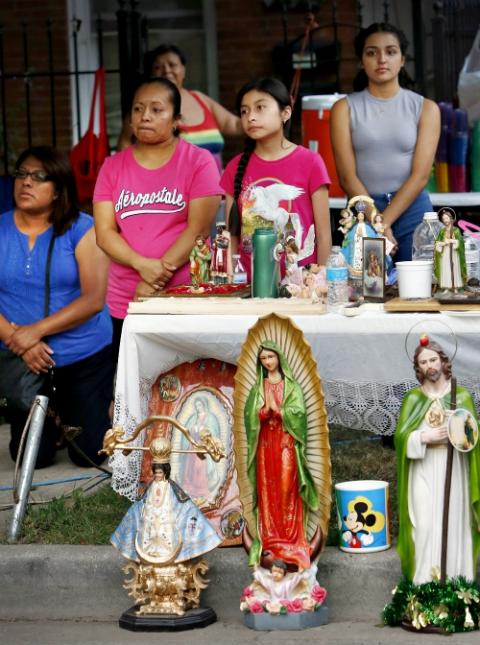
Worshipers pray during a street Mass held by St. Agnes of Bohemia Parish in the Little Village neighborhood of Chicago July 18, 2017. (CNS/Chicago Catholic/Karen Callaway)
Meanwhile, English speakers "view faith through a different lens and a lack of trust of a person or an institution leads to a lack of faith or trust in God."
From her perspective in the Chicago Archdiocese, Román said she hasn't heard of people leaving the church, but rather that there's a desire to cooperate with the church to prevent abuse.
"Hispanics — we love our church, and the crisis isn't going to push us away. On the contrary, it pushes us closer, because we want to pray; we want to do the work that is needed to keep the church growing and to keep our young people in the church."
Rosie Hidalgo, director of public policy for Casa de Esperanza, which mobilizes Latinos to end domestic violence, described "a lot of hurt and disillusionment and struggle, not wanting necessarily to leave the church but also finding it difficult to just continue to participate as if the status quo is OK, when it's not OK." She recently took a leave of absence as a lector at her church because of the crisis.
That Latino Catholics (along with some Euro-American Catholics) have been responding to the crisis with concern for priests and bishops is "not a callous disregard of the victims," said Jesuit Fr. Allan Figueroa Deck, distinguished scholar of theology and Latino studies at Loyola Marymount University.
Traditional cultures "generally seek to affirm authority, not to question it, starting with the authority of parents," Deck said. "So we shouldn't be surprised. ... There is a tendency to look at this as a very serious family issue, and not so much as a legal one."
For at least certain groups of Latinos, such as the often-undocumented immigrants in Tyson's diocese, it's difficult to relate to a legal framework at all.
"I'm talking about a legal system and the legal necessities to the people who don't have any legal standing," he said. "When you talk about the rights of the victims, it's like, I'm talking to people who don't have rights."
'Muy de padrecitos'
Latinos' love and respect for clergy, several experts told NCR, can lead them to be supportive in a constructive way but can also encourage clericalism and reluctance to hold clergy accountable.
"We tend to be muy de padrecitos," Román said. "We love our priests, and I think we contribute a lot to the clericalism. ... I don't see the backlash against the bishops with the Hispanic community with the outspokenness and the negativity that you do see in the rest of the Anglo community."
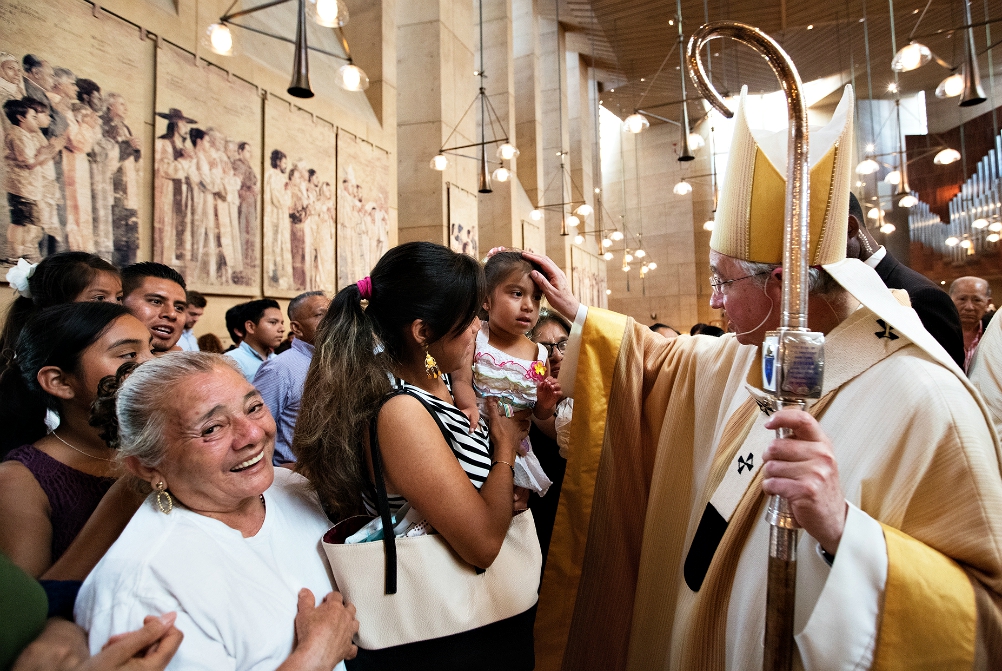
Archbishop José Gomez blesses a girl during a special Mass celebrated in recognition of all immigrants at the Cathedral of Our Lady of the Angels in Los Angeles in July 2016. (CNS/Vida Nueva/Victor Aleman)
That Latino Catholics are not "owning the entirety" of the church is what worries Becerra, who is also treasurer of the Federación de Institutos Pastorales. He's concerned that they are instead just claiming "the good parts of the Catholic church, the faith, the vibrancy, the missionary spirit that we brought into the V Encuentro. But we are not actually raising the questions about where the U.S. church is going."
Tyson described removing a priest from a heavily Mexican parish due to allegations of sex abuse. The experience was difficult because many parishioners had had a good experience of the pastor and didn't want to believe the allegations. Some even asked if he could return since he hadn't done anything wrong for six years.
"Across the board if you ask anybody, Spanish or English, should someone be removed from a parish if they've abused underage youth even once, [they say,] 'Oh yeah, do it.' But when it's their priest and they have had a good experience, they're very resistant. It's very divisive."
Tyson worries that this attitude might create a more dangerous climate for victims of sex abuse in Latino communities.
"It's been difficult to create that sense of urgency," Becerra said. The average churchgoer might not take the crisis seriously at all, while those who are more involved are concerned but not sure how to move forward. "They don't know how to talk about it because it's part of the ecclesiological understanding of the church. They believe that priests and deacons and bishops and archbishops and cardinals are exempt from being at fault. ... There's a lot of education to be taken into account."
Hidalgo noted that the church's role in welcoming immigrants and being a place of refuge "might make it more difficult particularly in an immigrant community for people to speak out and raise their concern at the same time that there's so many other issues confronting the immigrant community."
Advertisement
'We're losing the younger generation'
The differences between how Latino and Anglo Catholics respond to the sex abuse crisis, however, blurs when looking at the younger generation, which is more likely to opt for leaving the church altogether, regardless of ethnicity.
"Where they see the value of faith and spirituality, many of them don't see the moral credibility of the institutional church or of the clergy," Hidalgo said. "I do think we're losing the younger generation."
Living with the contrasting attitudes between generations, Román laments her sons' mistrust of the church and the institution's lack of moral credibility. Though one son married in the church to a former catechist, the couple doesn't go to Mass. The other son doesn't believe in organized religion.
"And here I am: My life is dedicated to the Catholic Church. So to have my sons not be a part of the church — that hurts me, and I pray for them, and I talk to them. They're just disappointed in the church, and the church has to deal with that."
Because those under 35 are especially connected to "every form of information," the church needs to work on public relations, Román said, which is "not something they tend to do well with this crisis. The church has to portray to our young people that they are doing something about the abuse so they can believe them. Young people are just not buying their responses."
While Latino Catholics tend to skew younger than Anglos (60 percent of Catholics under the age of 18 are Latino), 93 percent of Latinos under the age of 18 are born in the U.S., and therefore "might not be doing quite as much negotiating between two cultures like you would a generation or two ago," Day said. "They have a foot in both worlds, so they are going to be able to dialogue with the broader American sentiments as well as having that nuance."
Day points to the book Young Catholic America: Emerging Adults in, Out of, and Gone From the Church, which reports that while first-generation Latinos differ from non-Hispanic whites in their outlooks, the gap closes by the third generation.
"Certain practices that are more particular to Latinos — for example, saying the rosary — didn't fade away, but the more generations that a Latino has been in the U.S., the more their practices, behaviors and attitudes will look closer to white Catholics generally," Day said.
She also quoted a study that showed 53 percent of millennials say that their age group is the most salient part of their identity, above gender, politics, sexual orientation, race, or religion. "There is more solidarity that can happen among young adults" compared to previous generations, she said.
A call for synodality
Statements and invitations to pray and fast, Becerra said, "don't really inspire this sense of being a prophetic voice. ... Our bishops have been trying to spiritualize a very serious crisis," when instead, "structural change" should be at the forefront.
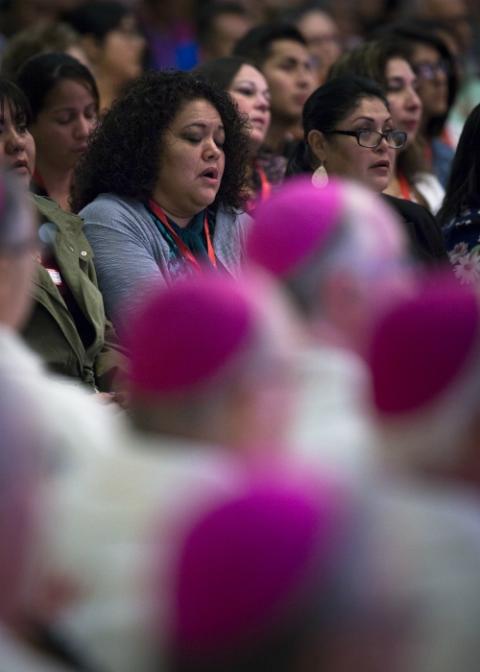
Women delegates are seen near prelates during the Mass for the Blessed Virgin Mary Sept. 22 during the Fifth National Encuentro in Grapevine, Texas. (CNS/Tyler Orsburn)
Deck agreed that what "lurks behind" the sex abuse is a structural issue, "namely that early on in the history of Christianity, leadership became identified with men. And in the 21st century, we have discovered that an all-male form of governance in the church is unhealthy."
The sex abuse crisis, he said, is "simply a deeper form of abuse" in which prelates are viewed as powerful leaders rather than servants of the church.
Almost all who spoke with NCR emphasized the need to elevate women within the church as a solution to the crisis. A common phrase that Becerra said he hears from women involved in ministry: "This crisis would have been handled differently if a woman could have been asked to intervene."
Román suggested priests reconnect their spirituality to Mary, and that churches should involve women beyond the role of parish secretary, instead bringing them in as "leaders who have opinions and can influence the church and make changes and help them."
Hidalgo echoed those frustrations, saying women's leadership in the church is "tokenized," and one reason she decided to stop being a lector at her parish.
Deck reiterated a keyword that Pope Francis has invoked, and one that was emphasized at the general assembly of the Confederation of Latin American and Caribbean Religious: synodality. "At the heart of that is a healthy, deep participation of all the faithful, particularly women, in the life of the church."
Synodality, he said, is the "door that will move us in the direction of reforms" — a word that shouldn't frighten Catholics, he said. Just as parishes have various councils involving laity, so too should they be tapped for the commissions that investigate bishops. "It's rather obvious that the main challenge we're facing is that bishops are accountable only to the pope in the law of the church," Deck said.
In the U.S., synodality would mean the Latino majority having greater impact, he continued. To ignore this group is to ignore the gifts of the Holy Spirit and "the many charisms that Latinos are bringing to the church that are struggling to find expression."
"People who are thinking seriously about our situation realize that it represents an opportunity to advance the structural reform of the church, to promote it," Deck said. "So while it's a terrible circumstance, it also brings with it an opportunity."
[Soli Salgado is a staff writer for Global Sisters Report. Her email address is ssalgado@ncronline.org. Maria Benevento is an NCR Bertelsen intern. Her email address is mbenevento@ncronline.org.]






